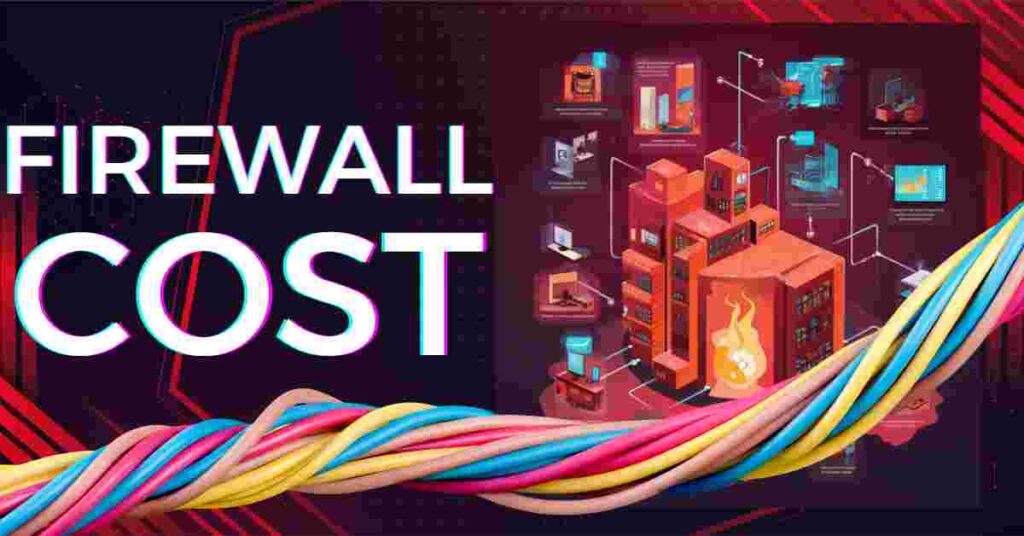Overview
Okay, let’s talk about firewalls. You know, those digital bodyguards for your business’s internet stuff? They’re essential, but figuring out cost to install firewall can be a bit like trying to solve a puzzle. But hey, we’ve got your back! This guide is like a friendly conversation about firewall prices. We’ll break it down firewall companies and their prices so you can make smart choices to keep your digital world safe.
Table of Contents
10 Key Points to Consider:
Affordable Choices: If you’re running a smaller business with fewer than 10,000 people, you’ve got some budget-friendly options to consider. Brands like Sophos or Fortinet offer solid protection without breaking the bank. You’re looking at shelling out around $700 for the hardware, which is quite reasonable.
For Bigger Businesses: Now, if your business is on the larger side, boasting over 25,000 folks on your network, you might want to explore more robust solutions. Names like Cisco or Palo Alto come to mind. These are like the heavyweight champions of the firewall world. They’re strong, but they can be a bit pricier.
Hardware Costs Vary: Hardware costs for firewalls can really run the gamut. For smaller businesses, you can snag one for about $700. But if you’re in the mood for something fancier, be prepared to dig deeper into your pockets. High-end models can easily soar past $10,000 or more.
Extra for Safety Features: Now, here’s a little wrinkle – those cool safety features you want? They’re not free. In fact, they can sometimes cost you 2 to 3 times the price of the hardware itself. So, that $700 firewall might need an additional $1500 for 3 years of top-notch security.
Labor Costs: Setting up a firewall isn’t like installing your average app. It’s a job for the experts. Expect to dedicate about 10 hours of their time to get everything just right. And that expertise? It’ll likely run you somewhere between $1,000 to $2,000.
Finding Experts: Speaking of experts, finding the right ones is key. You want folks who ask lots of questions and leave no stone unturned when it comes to making your digital fortress super secure. Not all IT professionals are created equal when it comes to firewall expertise.
Firewalls Are Crucial: Here’s the thing – firewalls are kind of a big deal. They’re like the shields of your network, fending off those pesky cyber villains and making sure everything runs smoothly. So, yeah, they’re pretty important.
Hardware vs. Software Firewalls: Now, let’s talk hardware versus software. There are differences, my friend. Hardware firewalls are the physical ones, and they can cost more. Software firewalls are the digital wizards, often easier to set up but sometimes lacking certain features.
Windows Firewall: If you’re just protecting your own personal device, Windows Firewall usually comes free with your operating system. But if you’re looking for some fancier features for your business, you might need to dive into a Microsoft 365 subscription.
Ease of Installing: Finally, how easy it is to install a firewall can depend on a few things. What type of firewall are you using? How tech-savvy are you? And just how complicated is your network setup? These factors can all affect the ease of installation.
cost to install firewall in table data
| Firewall | Usage | Starting Price | Website |
|---|---|---|---|
| pfSense | Personal use | Free | Website |
| Comodo Free Firewall | Personal use | Free | Website |
| GlassWire Firewall | Personal use | $29/year | Website |
| ZoneAlarm Free Firewall | Personal use | Free | Website |
| TinyWall | Personal use | Free | Website |
| Windows Defender Firewall | Personal use | Free | Website |
| pfSense | Small business use | Free | Website |
| Sophos Firewall | Small business use | Starting at $335 | Website |
| WatchGuard Firebox | Small business use | Starting at $640 | Website |
| FortiGate | Small business use | Starting at $520 | Website |
| SonicWall TZ Series | Small business use | Starting at $1,000 | Website |
| Cisco Secure Firewall Threat Defense Virtual | Small business use | Starting at $1,500 | Website |
| Check Point Next Generation Firewalls (NGFWs) | Big companies | Starting at $2,000 | Website |
| Sophos Firewall | Big companies | Starting at $2,000 | Website |
| VMWare NSX | Big companies | Starting at $5,000 | Website |
| Palo Alto VM-Series | Big companies | Starting at $10,000 | Website |
| Zscaler Internet Access | Big companies | Starting at $15,000 | Website |
| Cisco Secure Firewall Threat Defense Virtual | Big companies | Starting at $20,000 | Website |
Keep in mind that there are often extra expenses to consider, like licensing fees for additional security features. For example, if you’re setting up a mid-range firewall for a small to medium-sized business, the hardware itself might cost around $2,000, but you’ll also need to budget an additional $4,000 for three years of security feature licensing.
Pros and Cons
Pros:
- Budget-Friendly: Firewalls designed for personal use won’t empty your wallet. Many are free or very reasonably priced, making them accessible to everyday users who want online security without breaking the bank.
- User-Friendly: You don’t need to be a tech whiz to use these firewalls. They’re made for regular folks, offering simple setup and easy-to-understand interfaces. But don’t let their simplicity fool you; they provide robust security.
- Solid Protection: Even though personal firewalls are straightforward, they do an impressive job of safeguarding your devices from online threats. They act like a digital shield, keeping your personal data safe and sound.
- Feature Limitations: While personal firewalls are excellent for basic security, they might not have all the fancy extras that pricier options offer. So, you might miss out on things like intrusion detection and content filtering. But honestly, for many users, these extras may not be all that necessary.
- Limited Support: Some personal firewall products might not come with extensive customer support. If you run into issues, you might have to rely more on online resources or ask fellow users for help. Nevertheless, the online community can often be a valuable source of information and assistance.
For Small Businesses:
Pros:
- Growing with You: Small business firewalls are like flexible security partners. They can adapt as your company grows, ensuring your security keeps pace with your business expansion. So, you won’t outgrow your protection.
- Feature-Rich: Unlike personal firewalls, small business ones come loaded with advanced features. Think intrusion prevention systems, content filtering, and a bunch of other security options. In short, they offer a more comprehensive safety net.
- Strong Support: With small business firewall solutions, you can count on better customer support. This is especially handy when you need quick assistance with security issues. You get professional guidance when facing challenges.
- Higher Price Tag: The added features and support do come at a cost. Small business firewalls tend to be pricier than personal ones, reflecting the extra value they bring. Still, it’s an investment that’s worth it for businesses needing heightened security.
- Complexity: Managing these firewalls can be a bit more involved. You might need some technical know-how or even some help from IT professionals to set everything up correctly. But this complexity is what ensures your security stays strong.
For Big Companies:
Pros:
- Top-Notch Features: Enterprise firewalls are like the superheroes of security. They come with a full range of advanced features, from top-tier intrusion prevention to content filtering and super precise application control. Essentially, they’ve got all the security gadgets.
- Premium Support: In the world of big business, you need top-notch support. Luckily, enterprise firewalls provide just that. You’ve got access to expert assistance whenever you need it. So, your security remains in capable hands.
- High Investment: All those super features and premium support come with a hefty price tag. Enterprise firewalls are some of the priciest security solutions out there. But for large corporations dealing with sensitive data and complex operations, it’s a necessary investment.
- Complex Management: Dealing with these firewalls can be pretty intricate. It usually calls for dedicated IT teams or specialists to handle the setup, ongoing maintenance, and watchful monitoring. However, it’s this complexity that ensures your security stays at its peak.
Are firewalls easy to put in place?

Installing a firewall’s ease depends on several factors. It hinges on the type of firewall you’re using, your level of technical expertise, and the complexity of your network setup. In general, software firewalls like Windows Firewall tend to be relatively simple to install, making them accessible to users with basic computer skills. On the other hand, hardware firewalls can be more intricate, requiring specialized knowledge for proper placement within your network and configuring settings and you should know the firewall rules aswell To ensure your firewall works effectively, it’s often a good idea to enlist the help of experts for the setup process. For example, configuring a mid-range hardware firewall might take around 10 hours and cost between $1,000 and $2,000 when handled by professionals.
To sum it up
when choosing a firewall, pick one that matches your specific needs and budget. If you’re an individual user, the affordability and ease of use of personal firewalls make them a smart choice. Small business owners should consider the scalability and added features of small business firewalls. Meanwhile, larger enterprises may find the advanced features and top-tier support of enterprise firewalls essential for their complex security requirements.










